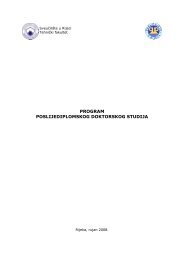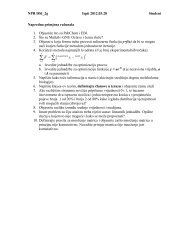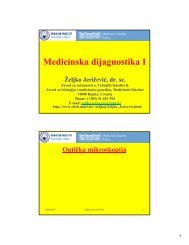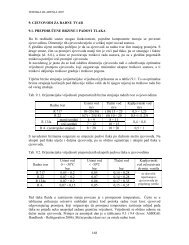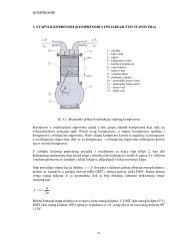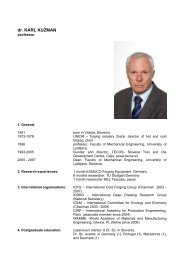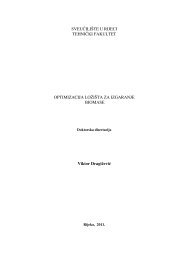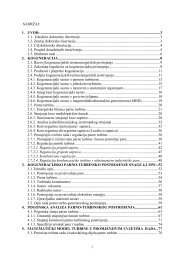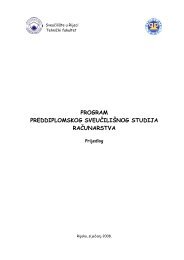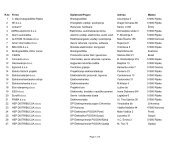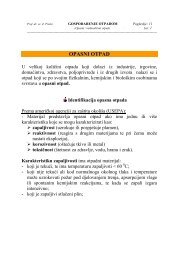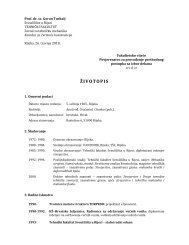universityâenterprise cooperation
universityâenterprise cooperation
universityâenterprise cooperation
Create successful ePaper yourself
Turn your PDF publications into a flip-book with our unique Google optimized e-Paper software.
24<br />
has been recently provided, in 2007, by the<br />
project “University-enterprise <strong>cooperation</strong>:<br />
building on new challenges from past<br />
experiences” (in the framework of Socrates<br />
Accompanying Measure) [77]. It was run by<br />
the DAAD (the German Academic Exchange<br />
Service) in a consortium consisting of ESMU<br />
(European Centre for Strategic Management of<br />
Universities), and National Socrates/Leonardo<br />
Agencies from nine countries (Austria, Finland,<br />
France, Hungary, Lithuania, Netherlands,<br />
Norway, Poland and Portugal) and with the<br />
contribution of several European universities.<br />
The project analysed the place of universityenterprise<br />
<strong>cooperation</strong> in EU education and<br />
training policies, to assess how universities<br />
have integrated this dimension in their<br />
strategic developments and activities, and<br />
to formulate recommendations on how the<br />
university-enterprise dimension can be further<br />
stimulated.<br />
The project also presented a snap-shot of<br />
the state-of-the-art of university-enterprise<br />
<strong>cooperation</strong> in Europe, with a view to identifying<br />
key areas which deserve particular attention<br />
and future actions. Out of 400 respondents<br />
from 34 countries in Europe, various types of<br />
university-enterprise <strong>cooperation</strong> activities<br />
were investigated and an assessment made<br />
of progress in the last few years.<br />
3.2.2. Features of university-enterprise<br />
activities<br />
At educational level, the Manufuture<br />
recommendations are to:<br />
• Build strong links between industry<br />
and academia, by establishing joint<br />
postgraduate degrees, postgraduate<br />
industrial training and industrial reallife-driven<br />
courses, and manufacturing<br />
departments;<br />
• Develop pattern to help to create SMEs<br />
that should foster a new industrial<br />
model in terms of the links with research<br />
centres and this group on enterprises;<br />
• Integrate all manufacturing qualifications<br />
of EU Member States into European<br />
engineering curricula;<br />
• Bring new teaching principles and<br />
industry-based case studies;<br />
• Re-organise educational programmes<br />
around new engineering disciplines with a<br />
high potential impact on EU manufacturing<br />
competitiveness;<br />
• Appropriate Manufuture International<br />
School, leading to Masters and PhD<br />
qualification in industrial research,<br />
based on research institutes and leading<br />
manufacturing companies.<br />
Assuring the future of manufacturing in<br />
Europe, the national and regional authorities<br />
must participate, either independently or in<br />
a complementary manner, by:<br />
• Fostering the creation of clusters and<br />
integrating SMEs into networks;<br />
• Developing competence in high-end<br />
manufacturing technologies;<br />
• Establishing local centers of excellence<br />
in manufacturing, incorporating a<br />
Manufuture network of educational and<br />
research communities, to permit the<br />
involvement of university researchers,<br />
knowledge transfer to industry and the<br />
formation of spin-off companies.<br />
At a general level, as identified by<br />
“university-enterprise <strong>cooperation</strong>:<br />
building on new challenges from past<br />
experiences” project, university-enterprise<br />
<strong>cooperation</strong> can be split up into different<br />
groups according to different features. This<br />
characterization could be made according<br />
to the degree to which universities are<br />
involved in one or more of these clusters<br />
of actions and activities. The developments<br />
in the field of university-enterprise<br />
<strong>cooperation</strong> are characterized by a gradual<br />
development of the concrete features<br />
mentioned below. Universities do not usually<br />
start by having a policy with a mission and<br />
vision statement, moving on to a strategic<br />
plan and then starting implementing<br />
activities. It can happen at random based<br />
on internal developments and European and<br />
international <strong>cooperation</strong>.<br />
1. A clear policy, mission and vision as to<br />
university-enterprise <strong>cooperation</strong>;<br />
2. The creation and functioning of structures,



